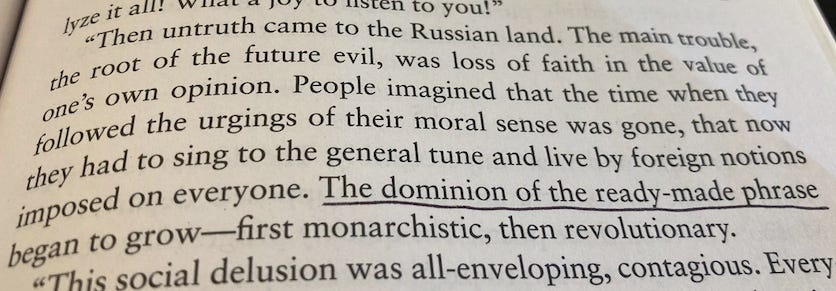The Decline into Automaticity
In the later chapters of Doctor Zhivago, Lara and Zhivago are trying to survive — apparently so they can have way more sex — and also trying to figure out what’s happened to bring them to this desperate position in the world. They reach this conclusion:
The dominion of the ready-made phrase is the social world of ritual chanting, the world of “Hate Has No Home Here” lawn signs and “Love Trumps Hate” bumperstickers, the world of the ideological statement ingested and regurgitated. It’s the dominion in which people know what they’re supposed to believe, so they say the line that indicates that they believe it. To recite the script is to declare a status; so, dangerously, is the refusal to recite the script. In this house we believe…
Seen at a drugstore in suburban Los Angeles this week:
This question had, of course, consumed me: does intolerance have a home at Rite Aid? “I want to buy this bottle of aspirin,” I would think, “but what then am I supporting, if buying aspirin at Rite Aid is racist?” I’m glad to see that they’ve cleared that up. My aspirin is anti-racist! Hate has no home in my medicine cabinet.
Václav Havel famously described this behavior in his essay “The Power of the Powerless,” in a report that explained the meaning of the ritual display of slogans in the dominion of the ready-made phrase:
The manager of a fruit-and-vegetable shop places in his window, among the onions and carrots, the slogan: “Workers of the world, unite!” Why does he do it? What is he trying to communicate to the world?
[….]
The slogan is really a sign, and as such it contains a subliminal but very definite message. Verbally, it might be expressed this way: “I, the greengrocer XY, live here and I know what I must do. I behave in the manner expected of me. I can be depended upon and am beyond reproach. I am obedient and therefore I have the right to be left in peace.”
In the dominion of the ready-made phrase, the repetition of the slogan is a shield: safety through compliance. Racism has no home at Rite Aid means please leave us alone. We are obedient and have the right to be left in peace, so far the prevailing social sentiment of the twenty-first century. The use of “let me be clear” is particularly telling. What does it mean? Does the speaker generally strive to be unclear, but from time to time has statements that he wishes to make clearly, so he seeks permission from the listener to allow him to temporarily descend into an unaccustomed clarity? If you find yourself using sets of words that don’t mean anything, notice.
But this emptying of expression, this transition to a ritual consumption of pre-chewed meals, has consequences, the first of which is that it’s So. Incredibly. Boring. The second is that people who lose their ability to speak off-script — which, God help me, many people seem to be doing — also lose their ability to think outside the limits of the ritual expression they’ve agreed to perform. The sharp and unexpected use of language reflects the operation of a creative mind, critical and analytical and awake.
In this house we believe that we’re glad this sign isn’t customizable, because then we would have had to think about making choices.
And this is how we get to an endless crisis that we can only escape through sustained compliance, but that never ends despite the prevalence of the compliance that’s supposed to end it. Get the jab! Stop the spread!
We are, literally, thoughtless. And it’s killing us.



*lol* re: the Dr. Zhivago intro 😂
BTW, you might appreciate “Lara” (by Anna Pasternak) and “The Zhivago Affair” (by Peter Finnn and Petra Couvée) for fascinating details on the political backdrop behind the writing of that novel.
Oh, and something tells me Rite Aid has no trouble discriminating against the vermin unvaxxed …